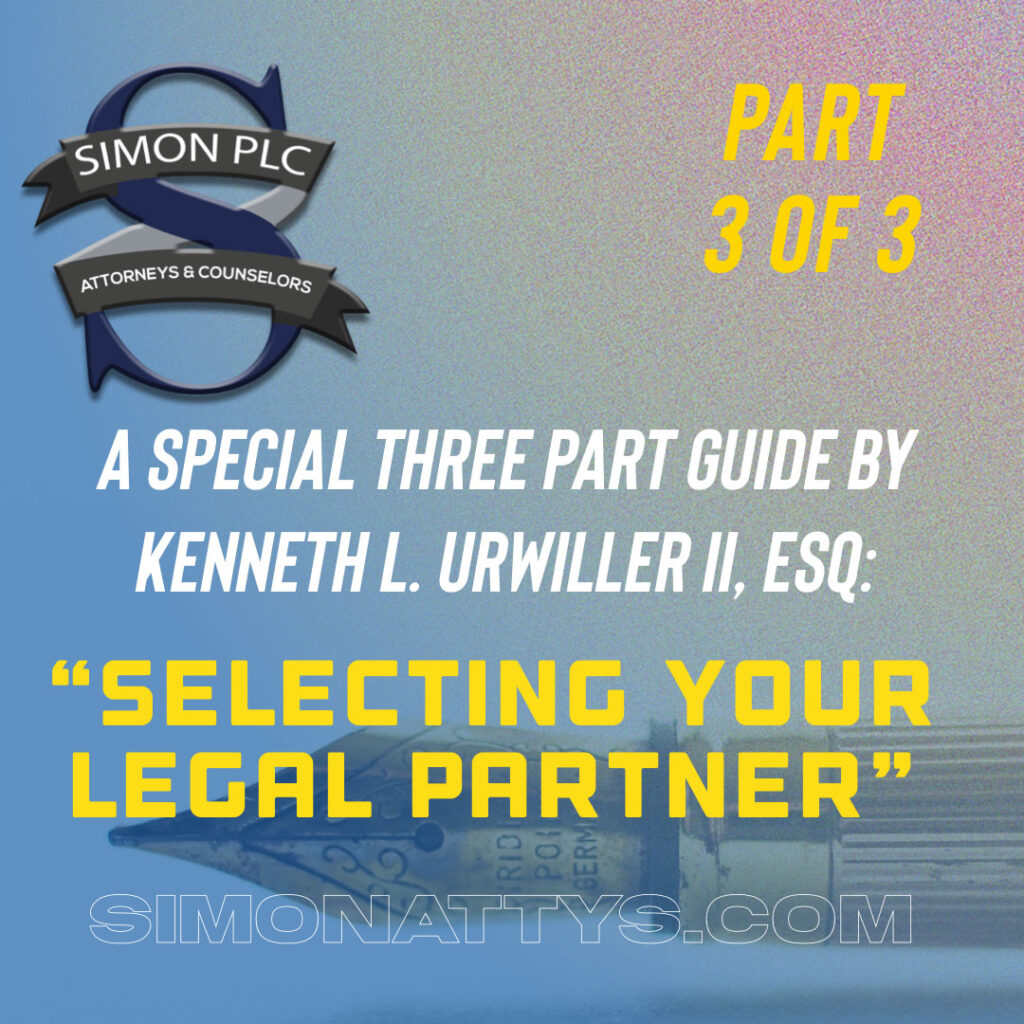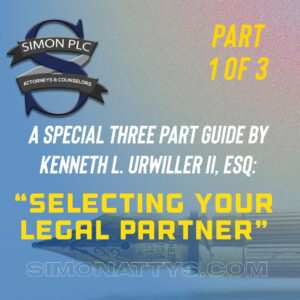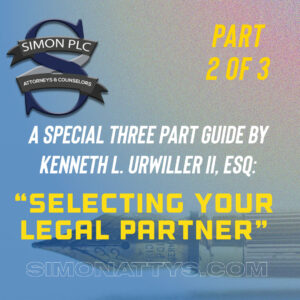Simon PLC Attorneys & Counselors – June 2022 Special Memorandum
Troy, Michigan – We are proud to continue our special three part memorandum series authored by our own Kenneth L. Urwiller II, Esq. With an outstanding career working for local Michigan and ultimately National Bank Associations, Ken brings his particular knowledge to the daily matters encountered by our clients.
In 2022 Ken has begun the process of sharing his thoughts and approaches in order to help banks and credit unions assess their litigation needs. Ken’s excellent three-part series on ‘Selecting Your Legal Partner’ continues from the very well received April 1, 2022, Part 1. – What’s your litigation culture? and Part 2. – How do you litigate? This month, the final installment, Part 3 – Making Your Selections, Ken provides his insights on picking the right firm for your institution’s needs.
Please enjoy and share Ken’s thoughts with your colleagues.
Selecting Your Legal Partner
© Kenneth L. Urwiller II, Esq.
Part 3 – Making your selections
By Kenneth Urwiller II, Senior Attorney
If your institution does not have a legal department or General Counsel, how do you approach litigation matters. In Part 1 of this series, we reviewed your institution’s culture. We suggested that you consider its values, vision and mission? We described strategies to collect, organize and analyze data from your past customer complaints and litigation. In Part 2, we explored four common litigation philosophies and used your information to help determine what type of litigation philosophy best fits your institution. In this part of the series, we will present some strategies to identify qualified local law firms. We will also discuss the interview process; propose a few considerations when conducting the interviews to help it be successful; and offer suggestions to help make your final selection. Our goal is to progress to the point where you feel properly armed and confident to choose a law firm that will fit well with your culture and litigation philosophy.
Identify qualifying firms
Partnering with more than one law firm is preferable to most banks and credit unions because there will be occasions when a conflict-of-interest arises that will prevent your primary firm from representing you. When this happens, you will want to be able to move quickly to secure alternative representation. This is most effectively and efficiently accomplished when you have already vetted your alternative firm.
Begin by identifying law firms in or near the communities your institution serves. You may want to diversify your pool of law firms between larger firms, medium size firms and smaller firms. This way you can ensure you obtain the broadest range of available representation options. If you do not have a larger firm in the communities you serve, check to see if one of your prospective firms is affiliated with a larger firm. Make sure to choose firms that specialize in or at least have extensive experience in representing banks and/or credit unions. These firms will be more familiar with the issues typically confronting financial clients like yourself. More knowledgeable and experienced attorneys will reduce your legal expenses by eliminating wasteful claims and ineffective defenses, avoiding needless legal research, preventing unnecessary employee participation, conserving other business resources and delivering superior advice earlier in the process.
Arrange meetings with your selected law firms. Select enough firms so you can acquire a solid understanding of the services available. Note how responsive each firm is to your initial communication. It may provide you with some insight into how the firm will communicate with you in the future or how important a client you would be considered. In-person meetings are preferable to a virtual meetings because they provide enhanced opportunities to interact with potential candidates to gain a more accurate understanding of their personalities, characteristics and abilities. It is difficult to get to know someone over a phone call or virtual meeting. Before you make your final decision, be sure you meet with both the firm’s designated relationship attorney and the specific attorneys assigned to handle your cases. It is important to ascertain the knowledge, experience and mindset of the specific assigned attorneys because they often provide significant strategic input as well as perform much of the legal work expensed to your cases.
The interview process
Thoughtful preparation is imperative to your success in interviewing law firms because every firm will claim to possess world-class knowledge, experience, be absolutely committed to the client and be expense sensitive. Consider all the verbal and non-verbal cues throughout the many conversations that occur during the meetings. From the work you already completed during this process, prepare a list of topics you want to cover and questions you want answered. Before each meeting is over, confirm that all your topics were addressed and your specific questions answered.
Some considerations for the interview process include:
- Observe the office location, equipment and other accouterments. Is the office location in an expensive area? Is there high-end office furniture and is its equipment the newest, fanciest and most expensive available? If so, someone is paying for all those high-priced things. Most likely their clients.
- Pay attention during casual moments before the meeting starts, during any break and after the meeting ends. Are the specific firm attorneys people you like and might enjoy working with, or is it a struggle to carry on even the simplest conversation?
- Ask what the firm’s billable hour rate is for staff, paralegals, associates and partners.
- Inquire as to what the minimum yearly billable hour requirements are for firm associates. This is important because associates in firms that require high minimum yearly billable hours are incentivized to spend more time working your case. Don’t be surprised if the firm is reluctant to provide this information for the aforementioned reason. However, if you ask, you can read their reaction and make your own determination.
- During the meeting, ask frank and honest questions. Discuss all the subjects important to you and listen carefully to the law firm’s answers. No relevant questions or topics should be off limits.
- Do the attorneys emphasize cost efficient procedural victories and appropriate cost-saving settlements, or do they boast of extensive pre-trial battles and trial accomplishments?
- Are the attorneys effectively listening to you and your team? Are they demonstrating a sensitivity to your organization’s concerns or simply asserting directives on what you need to do or should do? Is there a quality give-and-take discussion or do you feel like they are talking down to you? Remember, you are interviewing the firm. You are in charge of this process.
- Trust your gut. If the answers you’re receiving and exchanges you are having are not satisfying, then it’s probably not a good fit.
Making your selection
Once all your meetings with your potential law firms are concluded, evaluate the information and colleague impressions regarding each prospective firm objectively. Consider the cultural and personality fit of each law firm’s attorneys with your management and coworkers who will most likely be interacting with them. Consider their experience in handling the types of cases you anticipate receiving and prosecuting. How successful were they litigating those types of cases? Your goal is to hire attorneys who are smart, knowledgeable, articulate, effective, efficient, sensitive to your needs, and relatable to people like judges, juries and you. There are a lot of attorneys who fit this description. Therefore, retain a firm with people you believe you can trust and will enjoy working with. Someday you may need to hire someone you find difficult to work with for a specific case, but you don’t need to hire that person to work with on a regular basis.
With your investment of time to understand your institution’s culture, its past customer complaint and litigation history, its litigation risk, expense and time tolerances and litigation philosophy, together with your diligence to contact and interview your preferred law firms, you are positioned to retain the litigation firm that makes the best sense for your routine litigation matters. If you make a good choice, this relationship will grow stronger, and you will continue to see the benefits of this work long into the future. Good luck!
The information contained herein is not legal advice or meant to be an exhaustive discussion of all aspects of the subject matter. It is meant solely as an introductory dialogue to assist banks and credit unions without a legal department or internal counsel establish an approach to litigation matters.
[See also: Published April 1, 2022 Part 1. – What’s Your Litigation Culture? ]
[See also: Published May 1, 2022 Part 2. – How do you litigate? ]
N.B. Not Legal Advice: Please contact us if you would like to discuss the facts and circumstances of your specific matter. Simon PLC Attorneys & Counselors expressly disclaims all liability in respect to actions taken or not taken based on any or all the contents of this memorandum. The information contained herein may not reflect current legal developments and is provided without any knowledge as to the recipient’s location, industry, identity or specific circumstances. No recipients of this content, clients or otherwise, should act, or refrain from acting, on the basis of any content included in this memorandum without seeking the appropriate legal or other professional advice on the particular facts and circumstances at issue from an attorney licensed in the jurisdiction for which the recipient’s legal issue(s) involve. The application and impact of relevant laws varies from jurisdiction to jurisdiction, and our attorneys do not seek to practice law in states, territories and foreign countries where they are not properly authorized to do so.



